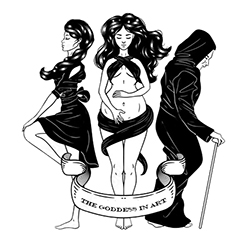
At the dawn of history, God was a she—or so it appears. Our paleolithic forebears, thirty or more millennia ago, conceived of Nature or the Divine as a cosmic female. They delighted in immortalizing her image on cave walls and in the form of statuettes carved out of stone, bone, ivory, or coal. Undoubtedly, they also used more perishable materials to depict the Great Mother, though these did not survive the ravages of time. The belief in the universal Female was deeply ingrained and vital.
The Great Mother, or magna mater, appeared under different names in the villages of the Near East and Europe. We do not know her earliest names, but later, after writing had been invented, she was celebrated as Inanna in Sumer, Ishtar in Babylon, Anath in Canaan, Astarte in Phoenicia, Isis in Egypt, Nu Kua in China, Freya in Scandinavia, and Kunapipi in aboriginal Australia. Thus, the Goddess became multiple, while retaining the universality that had been associated with her for countless generations.Each Goddess, while having her own name and distinct attributes, was hailed as the source of life, the life-granting power behind vegetation and fertility.
Her splendor was celebrated in many myths, and her favor was sought and her wrath appeased through numerous rituals. The Goddess was still supreme but no longer alone, for people’s imagination and religious feeling had made room for other personifications of the sacred reality. These included a virile male God, who was, however, at least temporarily still subordinate to the Goddess.
Read more